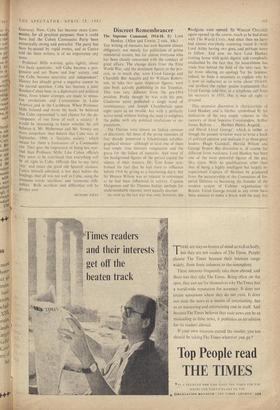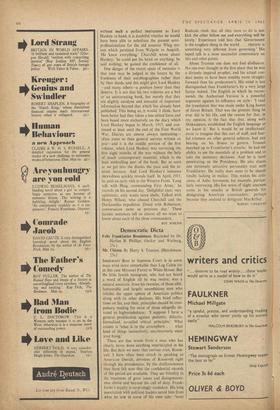Discreet Rem em brancer
The Supreme Command, 1914-18. By Lord Hankey. (Allen and Unwin, 2 vols., 84s.) THE writing of memoirs has now become almost obligatory, not merely for politicians of prime ministerial stature, but for alMost everyone who has been closely concerned with the conduct of great affairs. The change dates from the First World War, and the dominant figures in the pro- cess, as in much else, were Lloyd George and Churchill. But Asquith and Sir William Robert- son. to take two quite disparate figures. were also both actively publishing in the Twenties. This was very different from the pre-1914 position. Prolix though he was with his pen. Gladstone never published a single word of reminiscence: and Joseph ChaMberlain spent eight years as an invalid, but with a perfectly active mind. without feeling the need to enlighten the public with any political revelations or ex- planations.
The Thirties were almost 'an Indian summer of discretion. All three of the prime ministers of that decade preserved a Gladstonian autobio- graphical silence--although at least one of them had ample time between resignation and the grave for the fullest of memoirs. And most of the background figures of the period copied the silence of their Masters. Dr. Tom Jones sym- bolised the fact that he had risen to influence before 1918 by giving us a fascinating diary, but Sir Horace Wilson was as reticent in retirement a-; he had been influential in activity. Captain Margesson and Sir Thomas lnskip. perhaps for understandable reasons, were equally discreet.
As soon as the last war was over. however, the floodgates were opened. Sir Winston Churchill again opened up the course, much as he had done with The World Crisis. And since then we have had almost everybody cantering round it—with Lord Attlee having two goes, and perhaps more to follow. And now we have Lord Hankey trotting home with quiet dignity and completely unabashed by the fact that his leisureliness has made him behind the field of the next race. So far from offering an apology 'for. his lateness. indeed, he finds it necessary to explain why he is now so indiscreet as to write about 1914-18. and proffers the rather quaint explanation that Lloyd George told him. in a telephone call from his secretary in 1931. that it was all right to proceed.
This excessive discretion. is characteristic of Lord Hankey and is further symbolised by his dedication of his two ample volumes to 'the memory of three Supreme Commanders, Arthur James Balfour . . . Herbert Henry Asquith . . . and David Lloyd George'; which is rather as though the present revie\\ er were to write a hook of political opinion and dedicate it to three great leaders -Hugh Ciaitskell, Harold Wilson and George Brown, But discretion is. of course, far different from weakness. Lord Mulkey has been one of the most powerful figures of the past fifty years. With no qualifications 'other than that of being a highly intelligent but largely in- experienced Captain of Marines he graduated from the secretaryship of the Committee of- Im- perial 'Defence to becoming the founder of the modern system of Cabinet organisation in Britain. Lloyd George would in any event have been anxious to make a break with the past, but
without such a perfect instrument as Lord Hankey to hand, it is doubtful whether he would have been able to substitute the present semi- professionalism for the old amateur Whig sys- tem which persisted from Walpole to Asquith. `He knew everything.' Churchill wrote about Hankey; 'he could put his hand on anything; he said nothing; he gained the confidence of all.
One danger of the recent spate of memoirs is that men may be judged in the future by the frankness of their autobiographies rather than by their deeds, and this might give Lord Hankey —and many others—a position lower than they deserve. It is not that his two volumes are a bad or an uninteresting book, but merely that they are slightly anodyne and innocent of important information beyond that which has already been published. This being so, it would, I think, have been better had they taken a less edited form and been based more exclusively on the diary which Lord Hankey began in March. 1915, and con- tinued at least until the end of the First World War. Diaries are almost always interesting— often more so than general surveys written ex post—and it is the middle portion of the first volume, when Lord Hankey was surveying the first eight months of the war without the help of much contemporary material, which is the least enthralling part of the book. But as soon as we get into the diaries the pace and the in- terest increase. And Lord Hankey's immense shrewdness quickly reveals itself. In April, 1915, he paid an early visit to the Western Front. 'Long talk with Haig, commanding First Army,' he records on his second day. 'Delightful man; very optimistic; only wants more shells. Talked with Henry Wilson, who abused Churchill and the Dardanelles expedition. Dined with Robertson; conversation same as previous day.' These laconic sentences tell us almost all we want to know about each of the three commanders.
ROY JENKINS















































 Previous page
Previous page